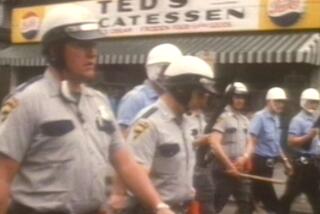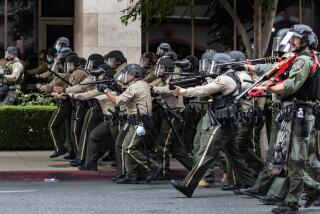Iraq’s mean streets
- Share via
NINE MONTHS INTO THE “Year of the Police” in Iraq, and three months into “Operation Together Forward” in Baghdad, the security forces remain disorganized and the city dangerous. The Bush administration and the Iraqi government are running out of strategies, if not slogans, as they try to bring some measure of stability to Iraq.
The news from Baghdad is particularly horrifying. Operation Together Forward, announced with great fanfare in June, was supposed to bring humanitarian aid and police protection to the most troubled areas of the city. Instead, with depressing regularity, Iraqi citizens report that police, or militiamen in police uniforms, have abducted people from their homes, arrested them at checkpoints and even, in one especially grisly scene reported in the Washington Post, dragged Sunni patients out of Baghdad hospitals controlled by the Shiite-dominated Health Ministry. Bullet-riddled corpses -- some handcuffed, some bearing the marks of torture -- are routinely found, but never the perpetrators.
As Latin Americans well know, death squads in police uniform can undermine public faith in government so utterly that it can take decades to restore. It is up to the Iraqi Interior Ministry, not U.S. forces, to establish and enforce the rule of law. But if the United States wants a viable alternative to “cutting and running” from Iraq, Prime Minister Nouri Maliki and his new interior minister will have to make good on their promises to overhaul the police force and purge units that have been infiltrated by militias -- if they still can.
Progress to date has not been encouraging. In March, three months after the Pentagon declared a Year of the Police in Iraq, Gen. John P. Abizaid acknowledged to the Senate Armed Services Committee what was already widely known: At least some Iraqi police units had been infiltrated by militias. “There may be some Iraqi police commandos who by day follow the orders of the government and by night might be doing the work of some of the various militia groups,” Abizaid said.
Last month, Abizaid offered the Senate committee a much grimmer assessment. Local police are honest and capable in some places, he said, but infiltrated by militias in others, notably in Basra and Baghdad. In Basra, British forces are attempting to disband the corrupted units and restart them. In Baghdad, he said, several battalions would probably have to be “stood down and retrained.” Pressed by Sen. Ben Nelson (D-Neb.) about the extent of the problem, Abizaid estimated that 30% of the Iraqi national police units had been infiltrated. By some estimates, scrapping and retraining the Iraqi police force could take up to two years and cost many millions of dollars. Leaving aside the military costs, such a move would be tantamount to an admission of failure by the Bush administration on one of its signature projects -- a political nonstarter during an election year.
It now seems clear that the two most prominent and influential Shiite militias, the Badr Brigade and the Al Mahdi army, are fiercely competing with the Iraqi police for control in Basra and Baghdad. Sunnis in these areas have good reason to fear the police almost as much as the insurgents and criminals who are terrorizing them. They are fleeing for Sunni-dominated areas, just as Shiites run from regions controlled by vindictive Sunnis.
It isn’t exactly ethnic cleansing, because the segregation is nominally voluntary. But the practical effect is the same. Sectarian violence, abetted or at least tolerated by the authorities, is producing the de facto ethnic partition of Iraq. The only way to stop it is to make the streets safe for Shiites and Sunnis alike, wherever they live. No army can do that effectively. Law and order, as well as a decent quality of life, depend on the police.
The Bush administration’s focus on the police is welcome. But real progress, if it comes, will depend on the Iraqis. Interior Minister Jawad Bolani, a technocrat named in June, impresses the U.S. military and is said to know what needs to be done. Unless he can purge the police, stop the politicization of his ministry and restore the rule of law, at least in Baghdad, U.S. forces may leave Iraq no safer than it was the day they arrived.
More to Read
Sign up for Essential California
The most important California stories and recommendations in your inbox every morning.
You may occasionally receive promotional content from the Los Angeles Times.










